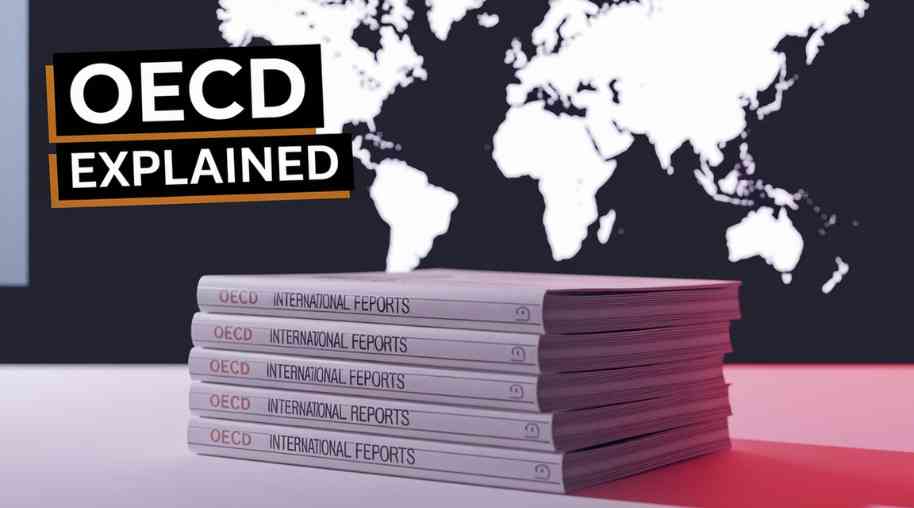OECD Full Form-Organisation for Economic Cooperation and Development
by Shashi Gaherwar
0 1018
Organisation for Economic Cooperation and Development (OECD): Role, Functions, and Global Impact
The Organisation for Economic Cooperation and Development (OECD) is a leading international body that promotes economic growth, policy coordination, and global trade. Established to foster global economic stability and prosperity, the OECD plays a crucial role in shaping policies that enhance economic development, trade, innovation, and environmental sustainability.

This article explores the OECD’s history, functions, membership, and its impact on the global economy.
What is the OECD?
The Organisation for Economic Cooperation and Development (OECD) is an international organization that brings together governments from around the world to develop policies aimed at improving economic and social well-being. Headquartered in Paris, France, the OECD provides a platform for dialogue, research, and collaboration among member nations to address pressing economic and social challenges.
Key Facts about the OECD:
• Established: 1961
• Headquarters: Paris, France
• Member Countries: 38 nations
• Mission: Promote sustainable economic growth, financial stability, and trade facilitation.
• Works with governments to develop policies on taxation, trade, environment, and digital transformation.
History and Evolution of the OECD
The OECD has its roots in the Organisation for European Economic Cooperation (OEEC), which was established in 1948 to administer the Marshall Plan for the reconstruction of Europe after World War II. As the global economy expanded, the organization was restructured into the OECD in 1961, broadening its scope to include economic policies worldwide.
Milestones in OECD History:
• 1948 – OEEC founded to oversee European recovery.
• 1961 – OECD officially established with 20 member countries.
• 1990s – Expansion to include emerging economies.
• Present – Focus on digital transformation, climate change, and global taxation policies.
OECD Member Countries
The OECD currently has 38 member countries, including leading global economies such as the United States, Canada, United Kingdom, Germany, France, Japan, and Australia. Emerging economies like Chile, Mexico, and Colombia have also joined the organization, reflecting its global reach.
OECD Membership Criteria:
• Commitment to democracy and market-based economy.
• Adoption of OECD policies and principles.
• Implementation of reforms to align with OECD standards.
Functions and Objectives of the OECD
The OECD plays a crucial role in shaping global economic policies through research, policy recommendations, and collaboration. The key functions of the organization include:
1. Economic Research and Policy Development
• Publishes economic outlook reports and country-specific policy reviews.
• Provides recommendations for economic reforms and governance.
2. Promoting Global Trade and Investment
• Works towards reducing trade barriers between countries.
• Develops policies that encourage foreign direct investment (FDI).
3. Taxation and Anti-Corruption Measures
• Leads initiatives like the Base Erosion and Profit Shifting (BEPS) project to combat tax avoidance.
• Establishes tax policies to ensure fair global taxation.
4. Digital Transformation and Innovation
• Supports policies for the regulation of artificial intelligence (AI) and digital markets.
• Encourages investments in research and technological advancements.
5. Sustainable Development and Climate Change
• Works with global organizations to combat climate change.
• Promotes clean energy policies and environmental sustainability.
Impact of the OECD on Global Economy
The OECD’s policies and reports influence governments, businesses, and financial institutions worldwide. Some of its key contributions include:
1. Setting International Economic Standards
• The OECD Economic Outlook Report provides guidance on global financial trends.
• It sets standards for corporate governance and anti-money laundering laws.
2. Influencing Government Policies
• OECD research helps governments shape effective economic and social policies.
• It provides guidelines on labor laws, healthcare, education, and taxation.
3. Encouraging Fair Trade Practices
• Works with the World Trade Organization (WTO) to promote free and fair trade.
• Advocates for trade policies that benefit developing economies.
4. Strengthening International Cooperation
• Collaborates with the United Nations (UN) and G20 on economic growth strategies.
• Assists developing nations in poverty reduction and financial stability.
OECD Reports and Publications
The OECD releases influential reports and publications that provide insights into global economic trends and policy recommendations. Some of the most notable reports include:
• OECD Economic Outlook – Analyzes economic trends and growth forecasts.
• OECD Employment Outlook – Focuses on labor market trends and employment policies.
• OECD Digital Economy Outlook – Examines the impact of technology on global economies.
• OECD Tax Policy Studies – Evaluates tax structures and their impact on businesses and individuals.
Challenges Faced by the OECD
While the OECD has significantly influenced global economic policies, it faces several challenges, including:
1. Addressing Economic Inequality
• Many critics argue that OECD policies favor developed nations over developing economies.
• The organization is working on inclusive growth policies to reduce wealth disparities.
2. Digital Taxation and Big Tech Regulation
• The OECD is at the center of global discussions on digital tax laws for multinational corporations.
• Challenges include balancing innovation with fair taxation.
3. Climate Change Commitments
• The OECD must push for stronger climate policies to ensure environmental sustainability.
• Encouraging all member nations to comply with global climate agreements remains a challenge.
Future Outlook of the OECD
As global economies continue to evolve, the OECD is expected to play an even more critical role in shaping policies for economic growth, sustainability, and digital transformation.
1. Focus on Digital and AI Policies
• Strengthening regulations around artificial intelligence and cybersecurity.
• Promoting ethical and responsible AI development.
2. Strengthening Developing Economies
• Increasing financial aid and trade access for developing nations.
• Providing policy recommendations for economic resilience.
3. Climate Change and Sustainability Goals
• Encouraging policies that promote green energy and carbon neutrality.
• Strengthening international cooperation on climate policies.
The Organisation for Economic Cooperation and Development (OECD) plays a pivotal role in shaping global economic policies, promoting trade, and ensuring sustainable development. With its research-driven approach, the OECD continues to provide valuable insights and recommendations to governments, businesses, and financial institutions worldwide. As challenges like digital taxation, climate change, and economic inequality persist, the OECD remains at the forefront of fostering international cooperation for a more inclusive and sustainable global economy.

Share:








Comments
Waiting for your comments